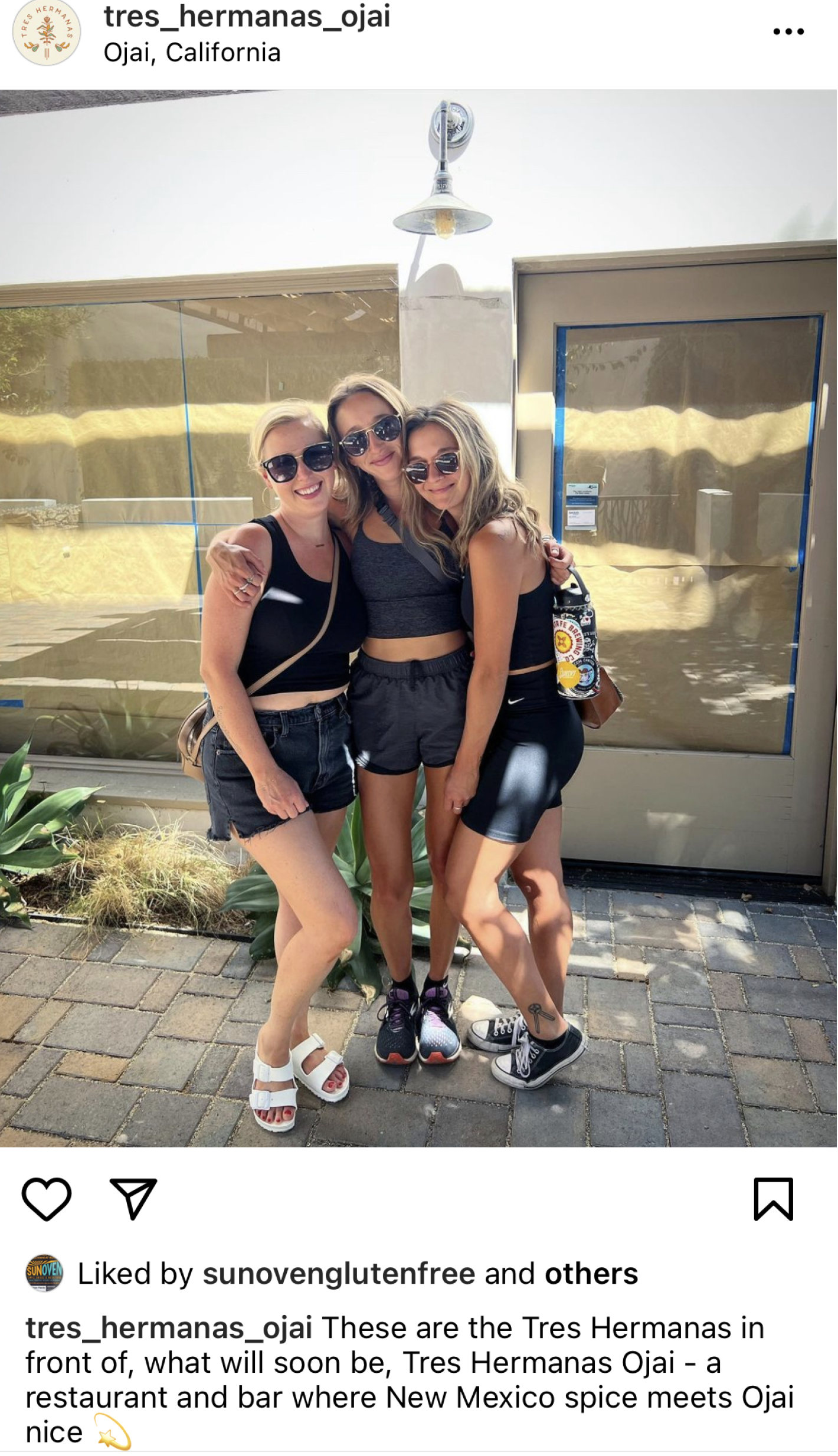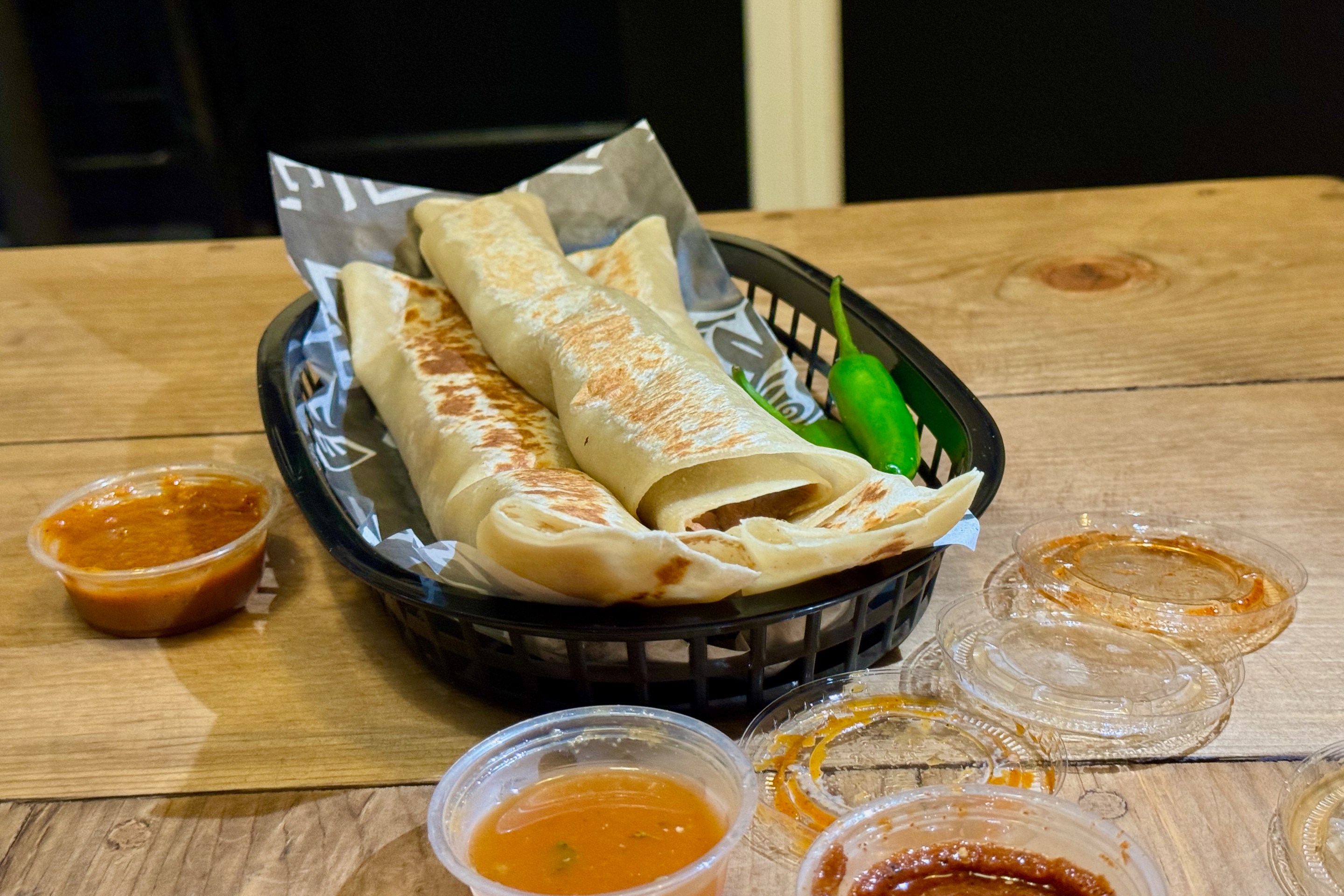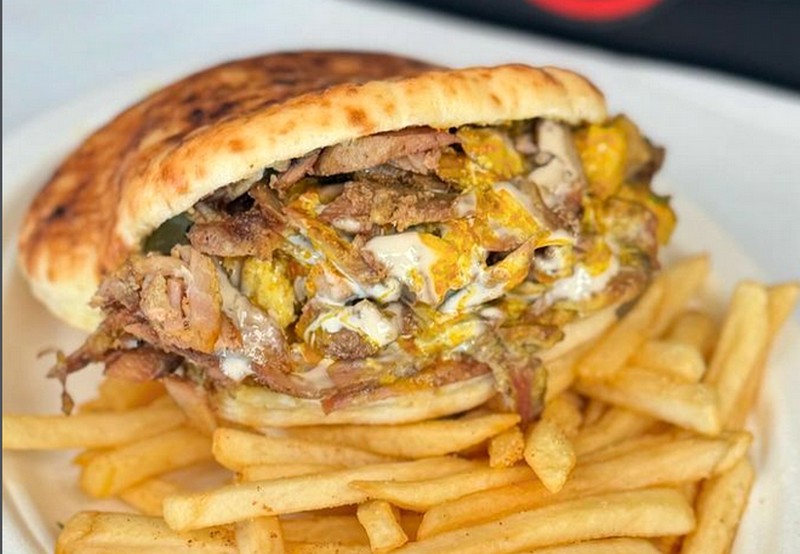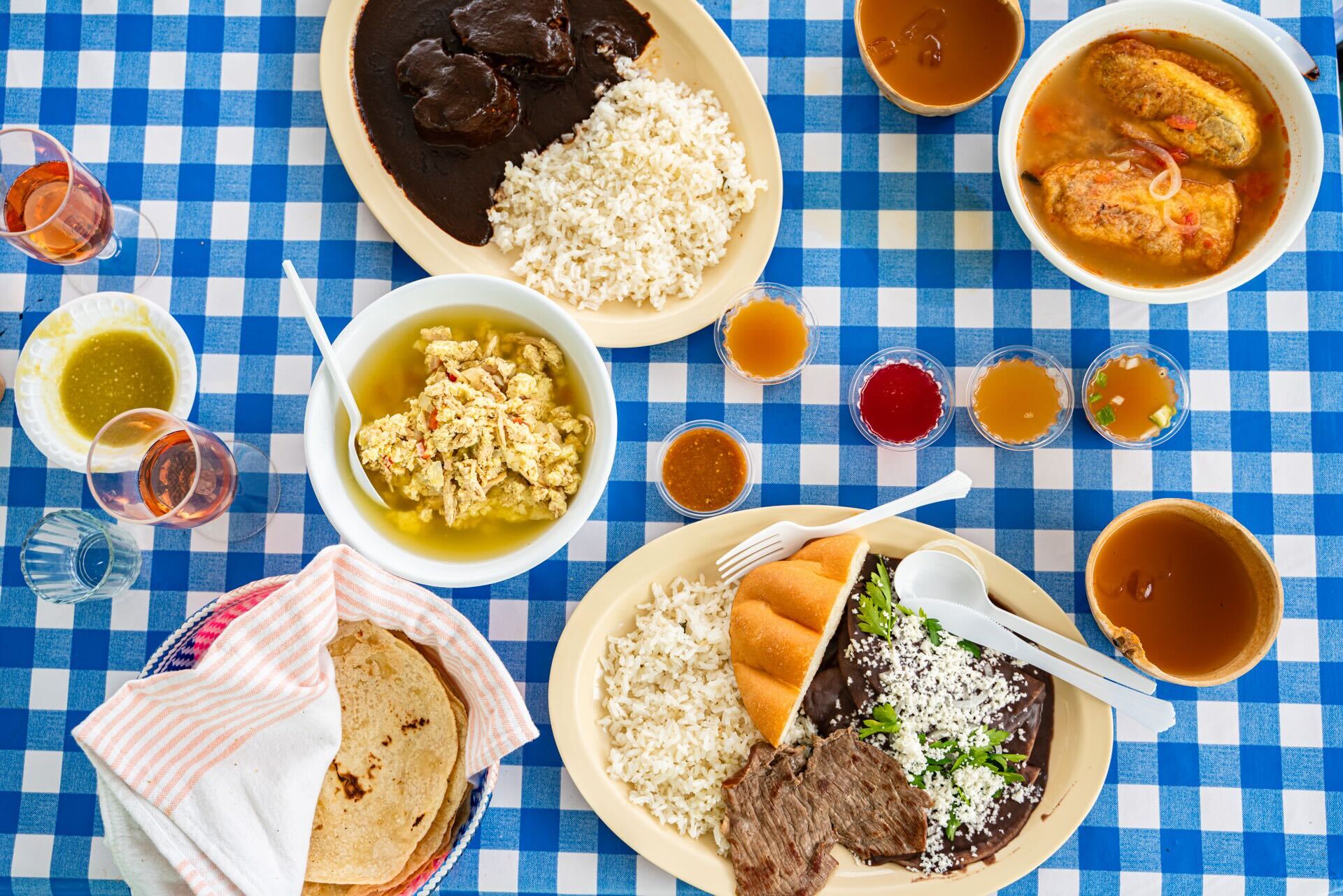Update: On Thursday, November 3rd, L.A. TACO received a statement from Michelle LeClerc, one of the three petition writers:
"We’d like to begin by thanking LA TACO for covering this story. As the petition writers, Miriam Velez Sanchez, Chiany Dri and I (Michelle Leclerc) never imagined it would receive so much attention. This movement is not anonymous. Every signature in the petition represents a name and a voice. Right now, there are over 1,200 voices asking for change.
Contrary to Sophia Miles, the co-owner of soon-to-be Tres Hermanas Restaurant in Ojai’s statements, we wish her restaurant well and look forward to her thriving business, which is why we designed our requests to be simple to implement before they launched a website or placed signage on their storefront. There’s a misconception that the petition was the only presence online that flagged issues of appropriation. We should point out that influencers on TikTok and Instagram as well as commenters on Instagram had been voicing concern in the days prior to the petition’s conception. Many of the comments on Tres Hermanas Ojai’s instagram were deleted, and the comments that remained disappeared when Tres Hermanas Ojai either archived or removed their Instagram page.
On September 8, we wrote the petition and spent the evening revising it without promotion. On September 9, we promoted and announced the petition, and it immediately began gathering signatures.
The meeting that we had planned for Saturday, Sept 17th with Sophia was designed to give suggestions on how these changes can be implemented with minimal costs in mind by providing suggestions based on our collective branding and DEI expertise. Unfortunately, Sophia canceled the meeting that day based on “outside advice and counsel and members of the community” whom she continues, “have all advised me not to meet with you.” Despite her clear indication that she would not meet with us, she had expressed a desire to meet in the future. Sophia has not requested a meeting since. We assumed she wished to address the petition concerns on her own, but if she wants or requires our assistance, we hope she reaches out. An Instagram DM is best.
Regarding contact, Sophia claims in the LA TACO article Instagram comments that the petition writers have been leaving threatening anonymous voicemails to local businesses. This is untrue. There have been no threats condoned by the authors of the petition, nor will we ever condone harassment. We ask that Sophia refrain from jumping to unfounded conclusions. If there are threats being made, we hope that she seeks assistance from the authorities.
There’s another misconception that this is just about the food, though none of the petition requests mention food. The restaurant’s statements on Instagram referenced concepts from Indigenous culture as part of their restaurant description before they were deleted. The restaurant’s website continues to do the same. It ties the restaurant’s brand story to the Iroquois/Haudenosaunee story and practice of Tres Hermanas or the Three Sisters. The use of indigenous folklore is continued in the restaurant’s name and logo. Finally, the choice to make the name in Spanish is potentially misleading to patrons who seek to support minority-owned businesses.
We hope that the owners of the restaurant, Sophia and her husband, will read the petition and petition comments from members of the local and Indigenous communities to truly understand why the restaurant’s concept continues to draw concern."
--
Update: At noon on October 31st, L.A. TACO received a statement on behalf of Tres Hermanas addressing the petition's accusation, written by the restaurant's owner, Sophia Miles:
An advisor said to me, “New Mexico's food and culture is truly special. There's nothing like it. The mix of Spanish and Mexican and Indigenous heritages are felt in everything that happens here - art, food, business, education, weather, events. It's why most of us choose to live here. It's hard to describe. If you have been here and spent time here, you know that it's hard to put your finger on why it's so unique.”
There have been misunderstandings of the concept and objective of Tres Hermanas Ojai. I put up an Instagram page, intending to post teasers to get the Ojai community excited for the restaurant, and to follow us along as we build and create this exciting new place. In the few posts on the Instagram, there was very little information about the inspiration behind the restaurant and our story, and I did a disservice to everyone involved by misrepresenting the business, the process, and the people who are integral in making this vision and dream come to life.
I love that New Mexico has its own food sub-culture, influenced by so many different backgrounds, creating one unique cuisine that celebrates the melting pot of these cultures. I believe its emblematic of the country that we could become, one where we celebrate our differences and come together to create something new, unique, and exciting. I am excited and honored to bring our take on this cuisine to Ojai, to introduce our town and those who visit to experience a small piece of New Mexico through our eyes.
Ojai is changing, and it has been changing for a while. The resistance to this change is seen throughout our community daily. We cannot reverse the change that has already happened, but we can do our best to ensure its path is headed in the right direction. Publicly shaming and petitioning against young local business owners and entrepreneurs is not the Ojai I know or the one I grew up in. Hiding behind social media without creating community discourse in a healthy and productive way is not the Ojai I know and grew up in. It is true that everyone has the right to petition, to speak their mind, and to use their voice to address issues that are important to them. But that comes with a responsibility to have all of the facts and all of the information, and even more of a responsibility in a small community to engage with community members first before taking a faceless and unaccountable route.
Today, the people of Ojai cherish the small-town community and energy. In Ojai, there is the general authenticity and comradery of locals and those who move here. Together, we strive to make sure Ojai continues to be a beautiful place, protecting the sacred lands of those who came before us, and a home to many. We can only do this if we work together with compassion, understanding, and humility.
Our website is now live, and there you will find information about Tres Hermanas Ojai: the inspiration, the restaurant, the collaborators, and what it means to us.
www.treshermanasojai.com
As a restaurant owner and entrepreneur, I am deeply inspired by food. Food connects people and brings them
together.
People who have opposing opinions, beliefs, and different views of the world can come together and
find a sense of connection and appreciation at the dinner table.
--
Originally published on October 27, 2022
A petition is being shared among Ojai residents accusing a soon-to-open New Mexican restaurant of cultural appropriation. “Indigenous and Latinx communities are not an aesthetic. They are historical, ancestral, and targeted. Using ‘New Mexico’ as a mask for appropriative actions, ignores important historical context, further marginalizing Indigenous and Latinx communities,” writes Chiany Dri, the petition’s creator.
“Ojai can do better than this and deserves better than this for ourselves and each other.”
The restaurant at the center of the controversy is Tres Hermanas, a New Mexican restaurant slated to open in Downtown Ojai “this winter,” according to the restaurant’s website. The tipster who notified L.A. TACO also sent a screenshot appearing to show three women alleged to be the restaurant’s owners, taken from Tres Hermanas Ojai’s Instagram account; it is no longer active.
In Susan Scafidi’s 2005 book, Who Owns Culture? Appropriation and Authenticity in American Law, largely considered to be the authoritative source on the subject, the author, attorney, and legal scholar defines cultural appropriation as: “Taking intellectual property, traditional knowledge, cultural expressions, or artifacts from someone else's culture without permission. This can include unauthorized use of another culture's dance, dress, music, language, folklore, cuisine, traditional medicine, religious symbols, etc. It's most likely to be harmful when the source community is a minority group that has been oppressed or exploited in other ways or when the object of appropriation is particularly sensitive, e.g. sacred objects.”
The core issue of appropriation at hand is the term “Three Sisters” in both the restaurant’s logo and concept—in Spanish. The petition reminds us that a term created by native Iroquois and Haudenosaunee people as a story of the three sisters, which is a full-circle growing practice of growing corn, squash, and beans recognized by many indigenous cultures across North America.
Ojai is located about 80 miles away from Los Angeles and is a popular weekend retreat or day trip destination, mostly for its peaceful environment and emerging dining scene. According to the 2021 census, Ojai’s population hovers at 7,500 residents—78% of which are white. New Mexico’s population is roughly ten percent native American, with 23 recognized tribes. Ojai sits on Chumash land, with native peoples inhabiting the land up to 1,000 years before Spanish settlers arrived in 1769 (then known as “Rancho Ojay”)
The petition has just over one thousand signatures and lists five requests to Three Sisters:
—The owner revise their logo and business name to remove elements that are of Indigenous and Latinx significance.
—The owner remove Indigenous storytelling elements from their mission statement and to be reflective of New Mexico and not of the Latinx and Indigenous cultures that preceded it.
—The owner hire or employ a Diversity, Equity & Inclusion consultant (or consultant with a similar and documented skill set) to help implement these critical and foundational changes in support of a meaningful and socially-conscious business ethos.
—The owner commit a percentage of their business earnings to be donated to a local non-profit organization specifically serving Indigenous and/or Latinx communities.
—The business release a statement of apology on their social media and online platforms acknowledging receipt of the petition, apologizing for any and all harm caused to the community, and outlining all changes and commitments being made by the business and its owner/s to address and repair any and all harm caused.
The owners of Three Sisters have allegedly responded to the petition, stating, "We are currently working with and in deep communication with our contacts and vendors in New Mexico. We are engaging with cultural anthropologists and with food culture specialists. We are researching the best and most appropriate non profit organization to make benefactors of our future restaurant. These are exactly and directly what the petition asked, and they are taken very seriously."
But the petition’s organizers say that isn’t enough and “not what the petition asks.”
A similar incident alleging cultural appropriation by a pop-up took place in Portland, Oregon, in 2017. That situation involved a breakfast burrito pop-up inside a Mexican-owned restaurant named "Kooks" in which the owners—one white and one part Asian—admitted to "stealing" the recipe for their handmade flour tortilla from a tortillera in Baja. Kook's ended up closing after that controversy.
L.A. TACO sent an email to the restaurant’s contact email requesting comment to find out more but has not heard back. The owners also link Tres Hermanas's "Sister Restaurant," Deer Lodge, on the Tres Hermana's website.
For further reading on the differences between cultural appreciation and cultural appropriation, read L.A. TACO’s story on the subject written by Melissa Mora Hidalgo, the trompo’s resident Ph.D. and Fulbright Alum scholar.





